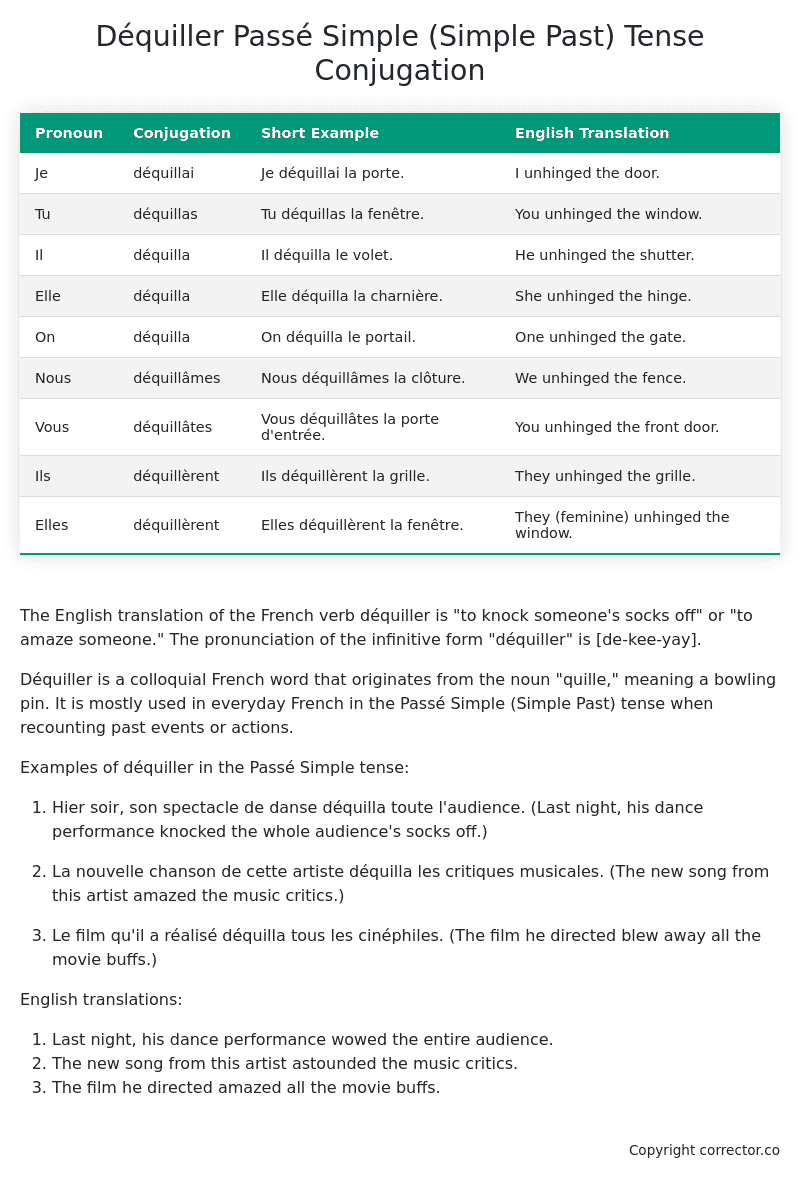Passé Simple (Simple Past) Tense Conjugation of the French Verb déquiller
Introduction to the verb déquiller
The English translation of the French verb déquiller is “to knock someone’s socks off” or “to amaze someone.” The pronunciation of the infinitive form “déquiller” is [de-kee-yay].
Déquiller is a colloquial French word that originates from the noun “quille,” meaning a bowling pin. It is mostly used in everyday French in the Passé Simple (Simple Past) tense when recounting past events or actions.
Examples of déquiller in the Passé Simple tense:
-
Hier soir, son spectacle de danse déquilla toute l’audience.
(Last night, his dance performance knocked the whole audience’s socks off.) -
La nouvelle chanson de cette artiste déquilla les critiques musicales.
(The new song from this artist amazed the music critics.) -
Le film qu’il a réalisé déquilla tous les cinéphiles.
(The film he directed blew away all the movie buffs.)
English translations:
- Last night, his dance performance wowed the entire audience.
- The new song from this artist astounded the music critics.
- The film he directed amazed all the movie buffs.
Table of the Passé Simple (Simple Past) Tense Conjugation of déquiller
| Pronoun | Conjugation | Short Example | English Translation |
|---|---|---|---|
| Je | déquillai | Je déquillai la porte. | I unhinged the door. |
| Tu | déquillas | Tu déquillas la fenêtre. | You unhinged the window. |
| Il | déquilla | Il déquilla le volet. | He unhinged the shutter. |
| Elle | déquilla | Elle déquilla la charnière. | She unhinged the hinge. |
| On | déquilla | On déquilla le portail. | One unhinged the gate. |
| Nous | déquillâmes | Nous déquillâmes la clôture. | We unhinged the fence. |
| Vous | déquillâtes | Vous déquillâtes la porte d’entrée. | You unhinged the front door. |
| Ils | déquillèrent | Ils déquillèrent la grille. | They unhinged the grille. |
| Elles | déquillèrent | Elles déquillèrent la fenêtre. | They (feminine) unhinged the window. |
Other Conjugations for Déquiller.
Le Present (Present Tense) Conjugation of the French Verb déquiller
Imparfait (Imperfect) Tense Conjugation of the French Verb déquiller
Passé Simple (Simple Past) Tense Conjugation of the French Verb déquiller (You’re reading it right now!)
Passé Composé (Present Perfect) Tense Conjugation of the French Verb déquiller
Futur Simple (Simple Future) Tense Conjugation of the French Verb déquiller
Futur Proche (Near Future) Tense Conjugation of the French Verb déquiller
Plus-que-parfait (Pluperfect) Tense Conjugation of the French Verb déquiller
Passé Antérieur (Past Anterior) Tense Conjugation of the French Verb déquiller
Futur Antérieur (Future Anterior) Tense Conjugation of the French Verb déquiller
Subjonctif Présent (Subjunctive Present) Tense Conjugation of the French Verb déquiller
Subjonctif Passé (Subjunctive Past) Tense Conjugation of the French Verb déquiller
Subjonctif Imparfait (Subjunctive Imperfect) Tense Conjugation of the French Verb déquiller
Subjonctif Plus-que-parfait (Subjunctive Pluperfect) Tense Conjugation of the French Verb déquiller
Conditionnel Présent (Conditional Present) Tense Conjugation of the French Verb déquiller
Conditionnel Passé (Conditional Past) Tense Conjugation of the French Verb déquiller
Conditionnel Passé II (Conditional Past II) Tense Conjugation of the French Verb déquiller
L’impératif Présent (Imperative Present) Tense Conjugation of the French Verb déquiller
L’impératif Passé (Imperative Past) Tense Conjugation of the French Verb déquiller
L’infinitif Présent (Infinitive Present) Tense Conjugation of the French Verb déquiller
L’infinitif Passé (Infinitive Past) Tense Conjugation of the French Verb déquiller
Le Participe Présent (Present Participle) Tense Conjugation of the French Verb déquiller
Le Participe Passé (Past Participle) Tense Conjugation of the French Verb déquiller
Struggling with French verbs or the language in general? Why not use our free French Grammar Checker – no registration required!
Get a FREE Download Study Sheet of this Conjugation 🔥
Simply right click the image below, click “save image” and get your free reference for the déquiller Passé Simple tense conjugation!

Déquiller – About the French Passé Simple (Simple Past) Tense
Formation
Usage
Narration
Historical Context
Interactions with other tenses
Passé Composé
Imparfait
Conditional and Subjunctive
Summary
I hope you enjoyed this article on the verb déquiller. Still in a learning mood? Check out another TOTALLY random French verb conjugation!


